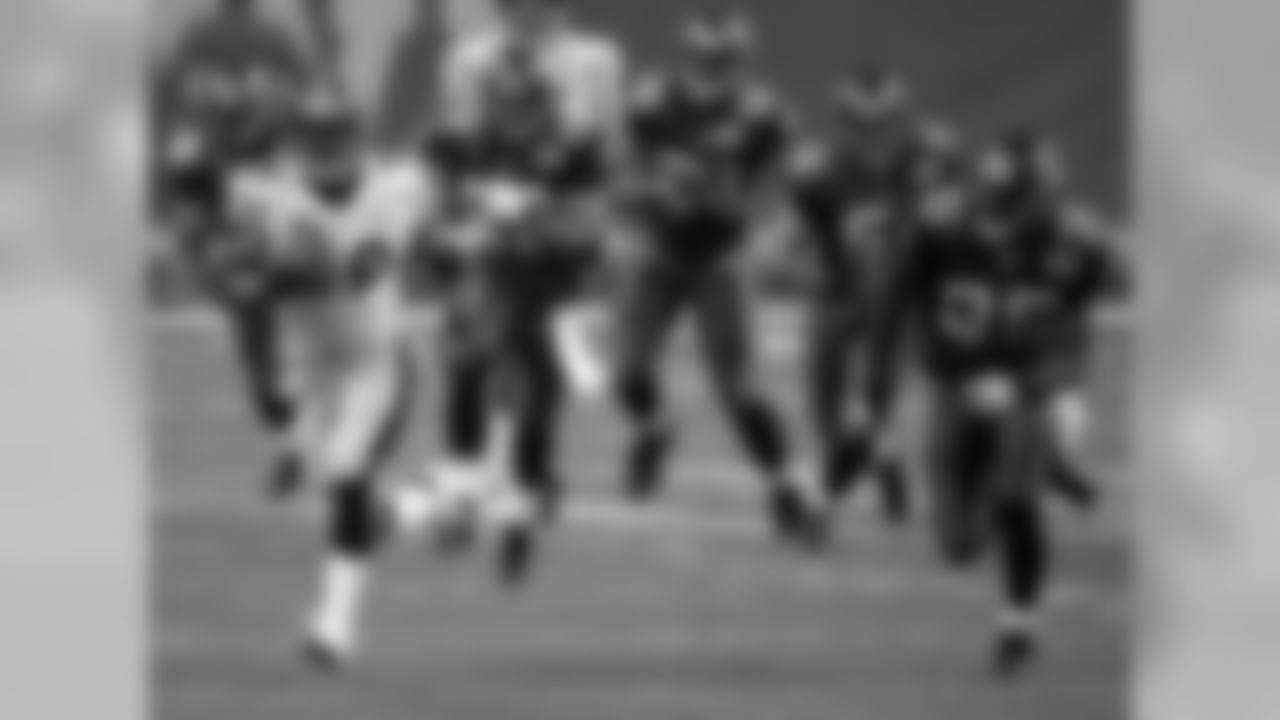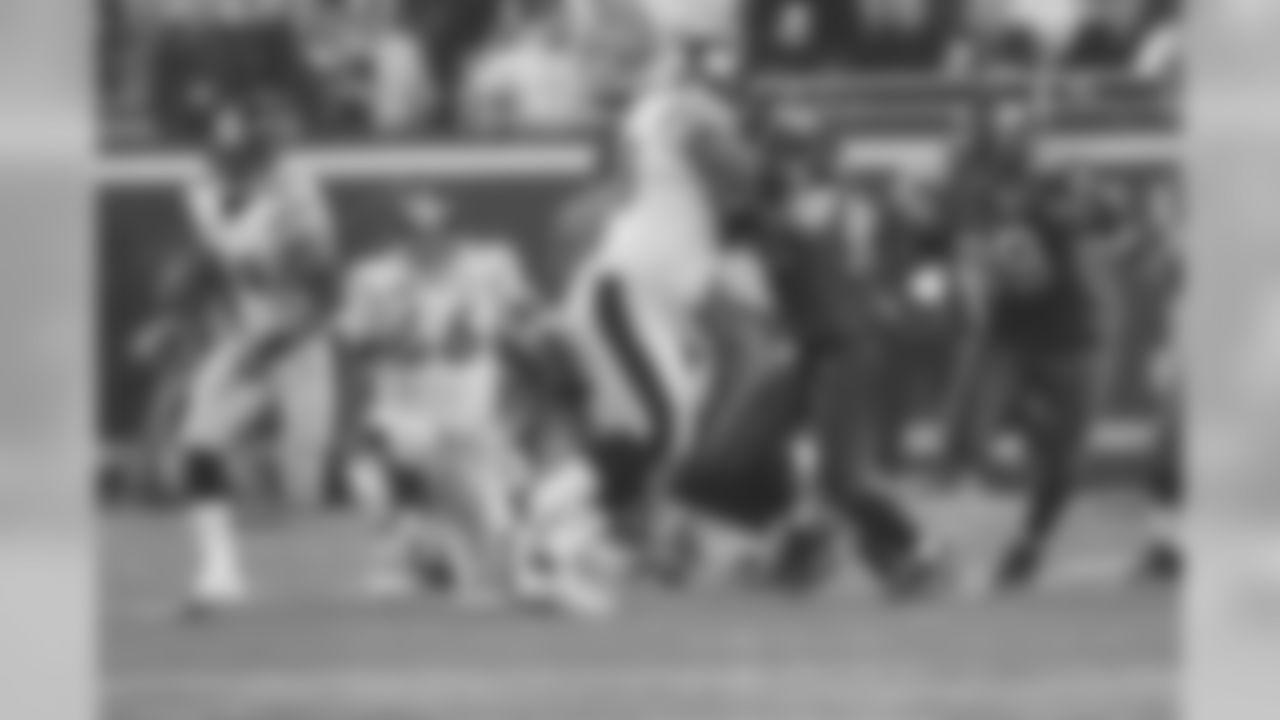- **BUY NOW: Alumni Weekend Wear What We Wear Gear**
 1 / 66Mike Fabus/© Pittsburgh Steelers
1 / 66Mike Fabus/© Pittsburgh Steelers





































































































































"It's a bit of a relief for me, because I didn't want to be relegated to a backup role or possibly have to play fullback when I know I'm capable of running the football," said Bettis on the day of the trade. "That was the frustrating part for me. I wanted to try to get the deal done so that I could look forward to running the football again. I'm just elated that the deal could go through."
Bettis' words proved prophetic, because he went and proved he had 10 more NFL seasons in his body, and during that time he played in 145 more games and carried 2,683 times for 10,571 yards and scored 78 touchdowns. Those numbers don't include the 13 playoff games in which he carried 199 more times for 675 more yards and nine more touchdowns. His 13-year career began as a first-round draft choice from Notre Dame and ended after the 2005 season, and his 13,662 yards leave him fifth on the NFL's list of all-time rushers, but with Jerome Bettis it's always been about more than statistics.
Jerome Bettis retired from the NFL while standing on the podium at Ford Field with the Lombardi Trophy in his hands, and that's not the only reason Bettis will be remembered as a man who retired as a champion. He was a leader in the locker room, an example, a mentor, a friend, a teammate through each of his 10 seasons with the Steelers. Ask Verron Haynes some time about Jerome Bettis' influence on his career. Ask Willie Parker about the time during his rookie year when Bettis took him to an up-scale restaurant so the next time in that situation wouldn't be Parker's first time. Ask all of them about how Bettis has helped them become a better player.
"He had a lot of influence, he just helped me out in a lot of ways," said Parker, who became the only back besides Bettis to post a 1,000-yard season during Bettis' decade with the Steelers. "He told me that in running to the outside, you have a lot of speed, and that a lot of people will think that you will go to the outside because I have speed. But he told me what I can really kill them at is when I run inside. He said inside runs are where long runs come from. It is hard to break a long run on the outside in the NFL, because everybody is fast in the NFL."
Bettis is the guy who took a pay cut in back-to-back seasons because he couldn't envision himself playing for a team other than the Steelers; he's the guy who welcomed Duce Staley to the team even though it was obvious the Steelers signed him to be a starter; he's the guy who so moved Staley that Staley went to Coach Bill Cowher midway through the 2005 season and offered up his own playing time. And through it all, Bettis gave back to the community, much of it through his The Bus Stops Here Foundation that was founded in 1996 to help underprivileged children.
"His character is so great. To me, he is the NFL," said defensive end Brett Keisel, a seventh-round draft choice from BYU in 2002. "He is everything that I think the NFL wants to be. He is professional, he's very well spoken, he's unselfish and he is everything guys try to be in this league. He's a great example for all of us, for all the things he does for the team and all of the things he does for Pittsburgh. He is just invaluable to this team."
And besides providing college tuition assistance through The Jerome Bettis Scholarship, and teaching fundamental life skills at The Jerome Bettis Pro Football Camp, and getting inner-city kids hands-on computer experience through the Cyber Bus Computer Literacy Program, the guy could play football.
"He's a fit here," said Bill Cowher in October 1996. "We're a hard-nosed football team. That's how we approach the game – with a no-nonsense attitude – and that's the way Jerome is. When Jerome came here, he really didn't stand out because he fit in. He fit in with the type of people we have around here. Those are people who recognize the difference between when it's time to play and when it's time to work. When you look around our locker room, those are the kinds of people we have. He was a natural fit. When you can get a guy to come in from another team and he fits, it really is an uplift for your team. The talents that Jerome has, and the way he has spoken without saying a word on Sundays, that's the best type of leadership you can get."
But leaders only have credibility if they first prove to their teammates that they're players. Bettis was voted Steelers MVP after each of his first two seasons following the trade to Pittsburgh; he posted six successive 1,000-yard seasons; and he led the team in rushing after eight of his 10 seasons here. And understand that while Jerome Bettis was carrying the football for the Pittsburgh Steelers, he was doing more than just gaining yards. He was setting the tone for the physical style Bill Cowher demanded.
"The most exciting thing," said center Jeff Hartings, "is to see him run over someone in the secondary. By the fourth quarter, you can tell. They aren't so anxious to hit him anymore."
And so it was through his last game as a professional. In Super Bowl XL on Feb. 5, 2005, in his hometown of Detroit, Bettis carried 14 times for 43 yards, and seven of those carries came late in the fourth quarter after the Steelers had taken a 21-10 lead and all that stood between them and the Lombardi Trophy was the time on the scoreboard clock.
"Jerome touched everybody," said Hines Ward, "every player on our team, some form, some way. He's touched coaches, players, trainers, everybody."
Bettis became the team's inspiration for the 2005 season that ended with a Super Bowl championship, and when Bill Cowher said that these Steelers were the closest team he's every had during his tenure as the coach, well, he knew Jerome Bettis was one of the main reasons why.
"At Jerome [Bettis]' house that night there were 30-40 guys sitting around just looking around at each other and we were having this great home-cooked meal," said Ben Roethlisberger about the dinner Bettis hosted for the team at his parents' house during Super Bowl week. "It made it feel like you were with your high school football team when you had your Friday night meals together. It was just neat because everyone was just laughing, joking, having fun and it was really something special. Everyone just kind of sat there as the night went on and just said went, 'Wow this is a special team.' It was a special opportunity, and it was great to be able to do that and I think that we are a very special and close team."
Jerome Bettis was a driving force behind that, which is why he deserves to be remembered as one of the special players in franchise history. Even players who don't say much always seemed to have something to say about him.
"I have been here six years and no one has been more of a leader on this team than Jerome Bettis," said tackle Marvel Smith. "It's a cliché, but he is the perfect pro. There are a lot of people who look up to him and want to be in his situation and copy what he does on and off the field."
It will have to be a copy, because the original is one-of-a-kind.